 |
 |
 |
The Lamb of GodThe Law of God - Part ThreeThe Lamb of God, and not just in symbol, is what is needed to provide for mans' greatest needs. We now come to that great event of Jesus' death at Calvary at which point many people think everything changed, the law was nailed to the cross and therefore done away with etc. But let's think of what really changed at that point in terms of the spiritual needs of man. Let's consider the basic principles regarding what man needs that have been identified in Part One and Part Two of this study. Man needs motivation to obey God, man needs a standard, a substitute, a mediator and reminders. Here is a quick assessment of those needs at the point of the cross:
We can now add the event of Calvary, the arrival of the Lamb of God, to the diagram and will then examine in more detail what might have changed at that point in relation to the spiritual needs of mankind.
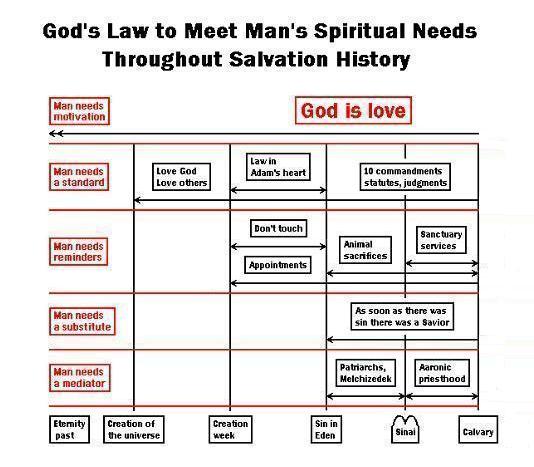 Standard When the Lamb of God came and was sacrificed at Calvary did man suddenly not need a standard anymore? What does the Bible say?
These are the verses that started this study. Let's look more closely at the meaning of "to fulfil." To fulfil does not mean to do away with (or destroy). If it did, the verse would essentially be saying: "I came not to destroy but to destroy" which, of course, is nonsense. The dictionary defines the meaning of "fulfil" as:
Here are some verses that show the shades of meaning of "to fulfil," using the same original term used in Matt 5:17:
None of the verses above includes the meaning of doing away with. Fulfil does not mean to do away with. You can read each of the 90 verses that use the original Greek word "pleroo" (Strong's #4137) and you will see that it is never used in the sense of "to destroy." Jesus death at Calvary as the Lamb of God had no effect on the validity or existence of the moral law of God which, as we have seen, is a transcript of the character of God Himself. The law still stands because it is based on the principle of love. Substitute Christ is still our substitute. Animal sacrifices never were a substitute but were object lessons, reminders and symbols of the true Sacrifice to come. Suddenly, they made a lot more sense as Jesus was seen as the true "Lamb of God." Mediator The earthly priests were also never really our mediator because they are not both God and man and cannot fulfil that role. In a sense, they too were only reminders and symbols of our one and only real Mediator. However, they were able to help in a way in this role by teaching the people etc. We could say that Caiaphas tearing his robe signified the end of the priesthood.
The law that was "changed" at this point was the law designating who should serve as priest. It is obviously not part of the moral law because it is law that was given in consequence of sin. If there had never been transgression of the moral law there would be no need for a mediator or for priests to serve in that role. The priesthood before the change referred to in Heb 7:12 consisted of the Levites. Since Jesus was of tribe of Judah there had to be a change in the law.
And so for Jesus to properly be a priest required "a change in the law" but it was not a change to the eternal moral law of God. In this case, the change in designation of who should serve as priest was consistent with the principle that man needs a mediator. Reminders
There had to already be a moral law for there to be sin because: "... sin is the transgression of the law. (1 John 3:4). The law referred to in Galatians that was "added because of transgressions" is the sacrificial system as given to Adam and as given in a more elaborate form to the Israelites at Mt. Sinai. Some have called this the ceremonial law. "Wherefore then serveth the [ceremonial] law? It was added [for our benefit] because of [our need to be reminded of the results of and the remedy for our] transgressions, till [implying it will come to an end] the seed should come ..." (Gal. 3:19, personally amplified version) Remember the order of events at Mt. Sinai? The 10 commandments were given, followed by the statutes and judgments which were really just the 10 commandments in more detail. Then, in Exodus 24, the covenant was ratified, after which nothing could be added to it. The subject of the covenant was the moral law of God. The ceremonial law, consisting of sacrifices and offerings was given because of man's transgression of the moral law, that through these services the sinner might discern the true sacrifice for sin, Christ Himself. The sacrifices and offerings that pointed forward to Christ's sacrifice as the true Lamb of God ended in terms of their significance and importance at the cross. However, they were actually continued by the Jews until 70 AD when the temple in Jerusalem was destroyed. Nailed to the cross? Now that we understand what happened at the cross relative to what existed previously in regard to the spiritual needs of man, let's look at a controversial question: what was nailed to the cross? We want to be clear what ended and what did not end. It could be said, in a figurative sense, that the ceremonial law was nailed to the cross because it did end at that point. However, we need to avoid the confusion over what is moral and what is ceremonial law. But something was literally nailed to the cross. Ask a child who knows the story of Jesus what was nailed to the cross and they'll tell you readily: Jesus was!
There is nothing about the moral law of God which was "against us" or "contrary to us" - it was all for our good. What was against us was the curses written for disobedience of the moral law (as opposed to blessings for obedience). "Behold, I set before you this day a blessing and a curse; A blessing, if ye obey the commandments of the LORD your God ... And a curse, if ye will not obey the commandments of the LORD your God ..." (Deut 11:26-28) Jesus had to die as the Lamb of God precisely because the law could not be changed. He paid the penalty that we owed. Man can pay the penalty himself and many, even most, will but that penalty - separation from a holy God - will cost them the second death and end their very existence. We recognize that nothing passed from the moral law; its principles still stand. But let's see if there is any expansion of the law of God after the cross, any new applications regarding the spiritual needs of man. The study on this site on Colossians 2 gives a much more detailed treatment of that passage and the question of what was nailed to the cross. Standard "A new commandment I give unto you, That ye love one another; as I have loved you, that ye also love one another." (John 13:34) The "love thy neighbour" part is not new: "Thou shalt not avenge, nor bear any grudge against the children of thy people, but thou shalt love thy neighbour as thyself: I am the LORD." (Lev 19:18) What's new is the "as I have loved you" part. Jesus, in His life on earth, set a standard by His own actions. Also, in His discourse about the law in the Sermon on the Mount, He raised the standard to include even the thoughts.
This is again an expansion of the law of God to include even the thoughts. If the thoughts are guarded, wrong acts can be prevented. Of course, this is only possible with God's help as we dwell on His word and ask for His guidance and protection. "For as he thinketh in his heart, so is he ..." (Pro 23:7) We could make a simple diagram of the moral law of God to illustrate how it has been expanded as needed:
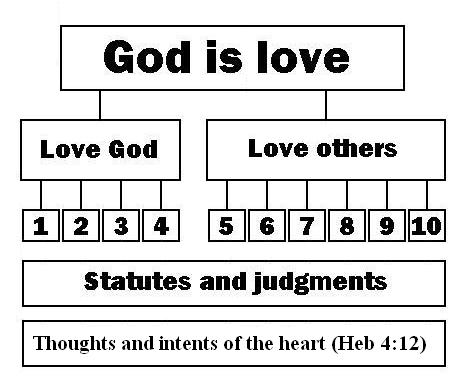 "Then one of them, which was a lawyer, asked him a question, tempting him, and saying, Master, which is the great commandment in the law? Jesus said unto him, Thou shalt love the Lord thy God with all thy heart, and with all thy soul, and with all thy mind. This is the first and great commandment. And the second is like unto it, Thou shalt love thy neighbour as thyself. On these two commandments hang all the law and the prophets." (Matt 22:35-40) I knew of one evangelist that liked to say that the all the commandments "hang, not drop" on these two commandments. This amplification of the law applies very much to how we treat and think of others. How far does this go? Matthew describes a process of dealing with problems between people in the church ending with: "And if he shall neglect ... let him be unto thee as an heathen man and a publican." (Matt 18:17) At first we might think that means that we should shun or ignore them. But how does God regard them? Jesus was a friend of publicans.
And Paul preached to the heathen. "... it pleased God ... To reveal his Son in me, that I might preach him among the heathen ..." (Gal 1:15-16) Let's add this newest expansion of God's law to our diagram. The new commandment expands our responsibility to God and our fellow man to include even our thoughts and guards us even further from disobedience.
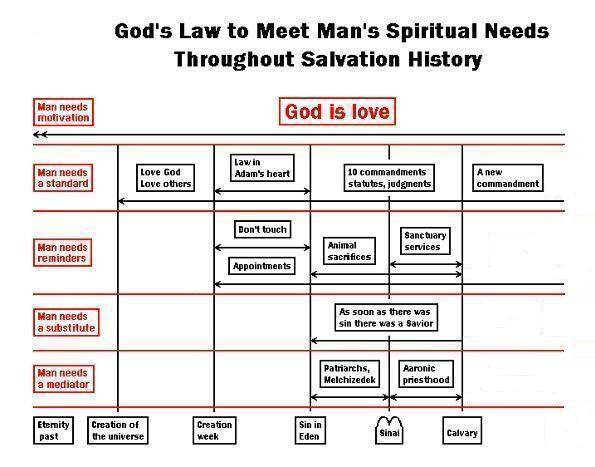 Substitute Christ is "our Passover." (1 Cor 5:7) Passover observers would offer a Passover sacrifice and partake of it at their celebration of the Passover meal at the feast of Passover. The term "Passover" used on its own can be used in reference to:
Which one it is referring to must be determined from the context. We could ask the question: "Christ is our Passover what?"
It is quite apparent that, from the cross on, when the Passover ceremony is observed on the Passover feast day, Christ, in symbol, is our Passover sacrifice.
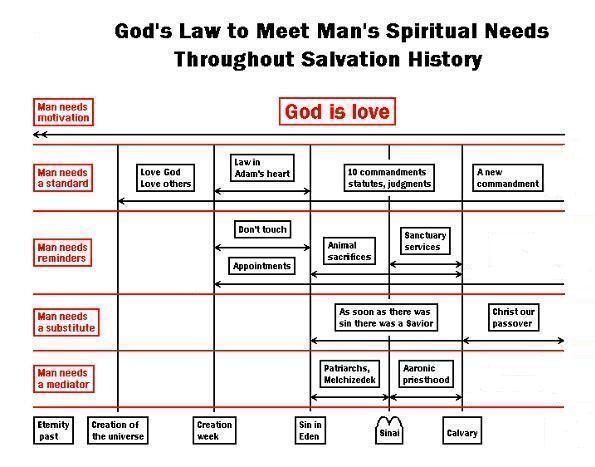 If Christ is our Passover, then there must be a Passover or His saying doesn't make sense. This is telling us that when Jesus instituted the memorial service (what we call the communion service) He was substituting Himself, the true Lamb of God, as the Passover sacrifice in place of the sacrificial animal previously used at the Passover meal. The Passover still exists. That is the Passover Feast Day and the Passover ceremony, although changed. Since the gospel commission has now gone to all people in all lands it would be reasonable to conclude that it is not to be observed just in Jerusalem. Paul was recorded to have observed one Passover and Feast Unleavened bread with the church at Philippi: "And we sailed away from Philippi after the days of unleavened bread, and came unto them to Troas in five days; where we abode seven days." (Acts 20:6)Mediator "For we have not an high priest which cannot be touched with the feeling of our infirmities; but was in all points tempted like as we are, yet without sin." (Heb 4:15) We can take out the double negatives (which cancel each other) and restate the verse: "For we have an high priest which can be touched with the feeling of our infirmities; but was in all points tempted like as we are, yet without sin." (Heb 4:15, modified) He "can be touched" He felt; He was tempted; He knows! And we can be assured that He knows. We have the account of His life and all that He endured for us.
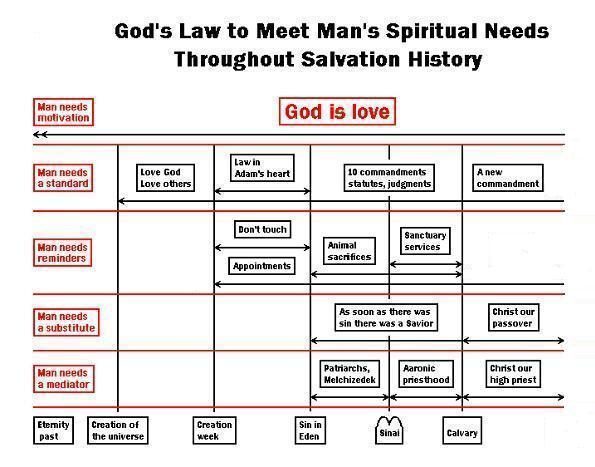 We can be assured that He can function as priest or mediator because He has experienced both roles, both divine and human. Having taken on the sins of the world Himself, He knows what it is like to feel in need of a mediator. RemindersWe can see from the following text that what was established by Christ at the Last Supper (as He substituted Himself, the Lamb of God, for sacrificaial animals) could be included in the category of reminders. "And when he had given thanks, he brake it, and said, Take, eat: this is my body, which is broken for you: this do in remembrance of me. After the same manner also he took the cup, when he had supped, saying, This cup is the new testament in my blood: this do ye, as oft as ye drink it, in remembrance of me. For as often as ye eat this bread, and drink this cup, ye do shew the Lord's death till he come." (1 Cor 11:24-26)
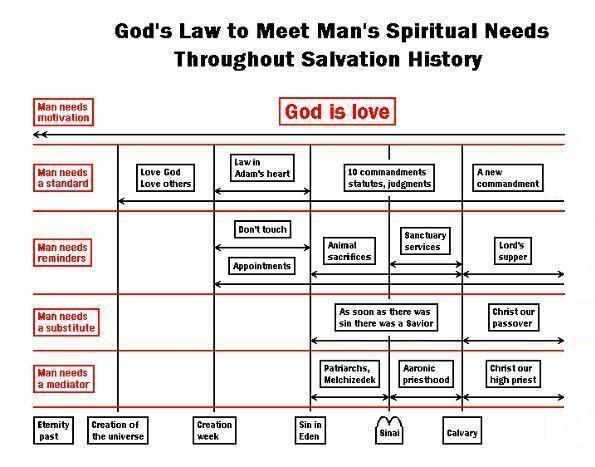 There is evidence from Jesus own words that the Passover was to continue: "And he said unto them, With desire I have desired to eat this passover with you before I suffer: For I say unto you, I will not any more eat thereof, until it be fulfilled in the kingdom of God." (Luke 22:15-16) The Passover will be fulfilled or filled full of meaning only in the kingdom of God. The End of Sin, The Law Restored to the Heart of Man We look forward to the end of sin. Man's spiritual needs are mainly the result of his sinful condition. When sin is no longer, man's needs will change. Sin will end because there will no longer be sinners. There will no longer be sinners because the wicked have finally been blotted out of existence and because the law will once again be in the hearts of mankind. Man will once again be able to dwell in the presence of God and so there will be no need of a structure to symbolize His presence.
Also there will be no need of substitutes or mediators. "For now we see through a glass, darkly; but then face to face: now I know in part; but then shall I know even as also I am known." (1 Cor 13:12) We will then know God much better than we do know. There will be no dark veil between.
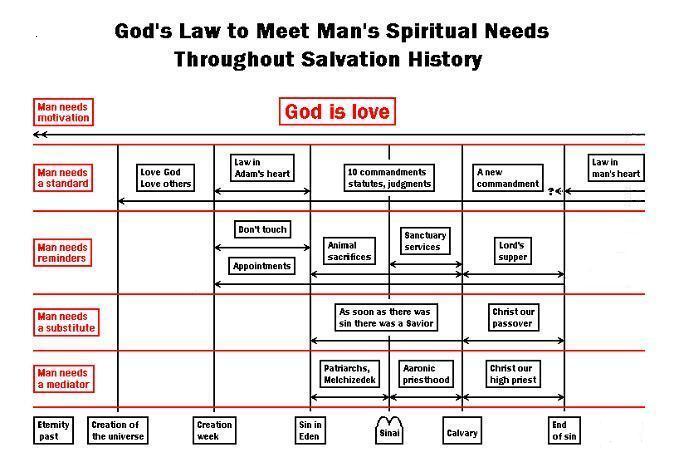 So we have added the point of the end of sin to our diagram and shown that once again the law is written in man's heart. Not just a partial knowledge of that law but a complete knowledge and also a willingness to obey it. Now we want to examine any further changes in man's needs beyond that point. What will remain?
Those visible scars from his wounds will ever be a reminder that He is the Lamb of God. This will help to keep in our minds the great cost of our redemption. No Reason to End Appointments "For as the new heavens and the new earth, which I will make, shall remain before me, ... it shall come to pass, that from one new moon to another, and from one sabbath to another, shall all flesh come to worship before me, saith the LORD." (Isa 66:22-23) There is no reason to end our appointments with God. God's appointments with us are the very reason He created us - for fellowship with Him. Note that the Reminders section of the diagram below has a dashed arrow and a question mark for appointments extending into the past before creation week. Although I don't have a verse for it, I think it is possible that appointments have existed for other created beings before creation week on earth.
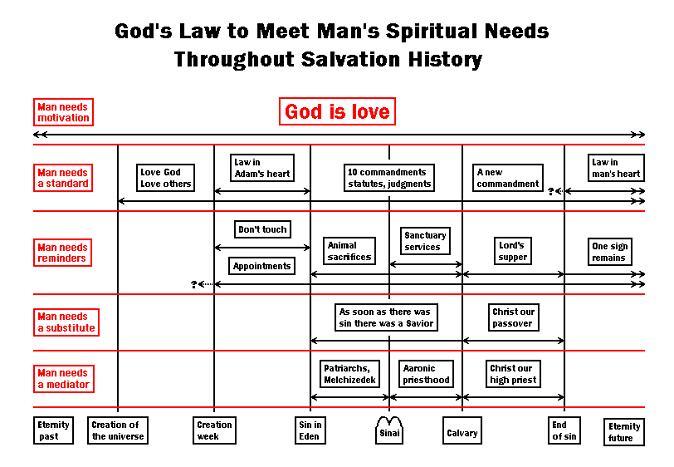 Some day we will have come to the end of sin and will be facing eternity future. The diagram now shows double arrowheads indicating an extension into eternity future for what remains:
Looking back, we will see that everything God has done in dealing with man - even to the extent of providing His own Son as the Lamb of God - has been based on eternal principles all established for the good of man. The one principle, above all others, that has determined everything He has done can be summed up by the principle that "God is love." End of Study
|
Prophecy Newsletter
Receive
free newsletters
reporting and analysing world events related to prophecy.
The Greek has multiple words for forgiveness? God forgives (charizomai) whether we ask or not. Receiving forgiveness (apheimi) is by our choice.
God always forgives!
|
|
|
|
||
|
| ||

New! Comments
Have your say about what you just read! Please leave a comment below.